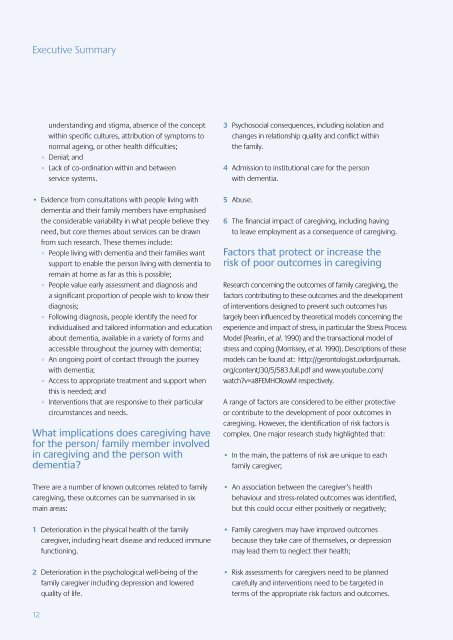The experiences needs and outcomes for carers of people with dementia
RSAS-ADS-Experiences-needs-outcomes-for-carers-of-people-with-dementia-Lit-review-2016
RSAS-ADS-Experiences-needs-outcomes-for-carers-of-people-with-dementia-Lit-review-2016
You also want an ePaper? Increase the reach of your titles
YUMPU automatically turns print PDFs into web optimized ePapers that Google loves.
Executive Summary<br />
°<br />
°<br />
underst<strong>and</strong>ing <strong>and</strong> stigma, absence <strong>of</strong> the concept<br />
<strong>with</strong>in specific cultures, attribution <strong>of</strong> symptoms to<br />
normal ageing, or other health difficulties;<br />
Denial; <strong>and</strong><br />
Lack <strong>of</strong> co-ordination <strong>with</strong>in <strong>and</strong> between<br />
service systems.<br />
• Evidence from consultations <strong>with</strong> <strong>people</strong> living <strong>with</strong><br />
<strong>dementia</strong> <strong>and</strong> their family members have emphasised<br />
the considerable variability in what <strong>people</strong> believe they<br />
need, but core themes about services can be drawn<br />
from such research. <strong>The</strong>se themes include:<br />
° People living <strong>with</strong> <strong>dementia</strong> <strong>and</strong> their families want<br />
support to enable the person living <strong>with</strong> <strong>dementia</strong> to<br />
remain at home as far as this is possible;<br />
° People value early assessment <strong>and</strong> diagnosis <strong>and</strong><br />
a significant proportion <strong>of</strong> <strong>people</strong> wish to know their<br />
diagnosis;<br />
° Following diagnosis, <strong>people</strong> identify the need <strong>for</strong><br />
individualised <strong>and</strong> tailored in<strong>for</strong>mation <strong>and</strong> education<br />
about <strong>dementia</strong>, available in a variety <strong>of</strong> <strong>for</strong>ms <strong>and</strong><br />
accessible throughout the journey <strong>with</strong> <strong>dementia</strong>;<br />
° An ongoing point <strong>of</strong> contact through the journey<br />
<strong>with</strong> <strong>dementia</strong>;<br />
° Access to appropriate treatment <strong>and</strong> support when<br />
this is needed; <strong>and</strong><br />
° Interventions that are responsive to their particular<br />
circumstances <strong>and</strong> <strong>needs</strong>.<br />
What implications does caregiving have<br />
<strong>for</strong> the person/ family member involved<br />
in caregiving <strong>and</strong> the person <strong>with</strong><br />
<strong>dementia</strong>?<br />
<strong>The</strong>re are a number <strong>of</strong> known <strong>outcomes</strong> related to family<br />
caregiving, these <strong>outcomes</strong> can be summarised in six<br />
main areas:<br />
1 Deterioration in the physical health <strong>of</strong> the family<br />
caregiver, including heart disease <strong>and</strong> reduced immune<br />
functioning.<br />
2 Deterioration in the psychological well-being <strong>of</strong> the<br />
family caregiver including depression <strong>and</strong> lowered<br />
quality <strong>of</strong> life.<br />
3 Psychosocial consequences, including isolation <strong>and</strong><br />
changes in relationship quality <strong>and</strong> conflict <strong>with</strong>in<br />
the family.<br />
4 Admission to institutional care <strong>for</strong> the person<br />
<strong>with</strong> <strong>dementia</strong>.<br />
5 Abuse.<br />
6 <strong>The</strong> financial impact <strong>of</strong> caregiving, including having<br />
to leave employment as a consequence <strong>of</strong> caregiving.<br />
Factors that protect or increase the<br />
risk <strong>of</strong> poor <strong>outcomes</strong> in caregiving<br />
Research concerning the <strong>outcomes</strong> <strong>of</strong> family caregiving, the<br />
factors contributing to these <strong>outcomes</strong> <strong>and</strong> the development<br />
<strong>of</strong> interventions designed to prevent such <strong>outcomes</strong> has<br />
largely been influenced by theoretical models concerning the<br />
experience <strong>and</strong> impact <strong>of</strong> stress, in particular the Stress Process<br />
Model (Pearlin, et al. 1990) <strong>and</strong> the transactional model <strong>of</strong><br />
stress <strong>and</strong> coping (Morrissey, et al. 1990). Descriptions <strong>of</strong> these<br />
models can be found at: http://gerontologist.ox<strong>for</strong>djournals.<br />
org/content/30/5/583.full.pdf <strong>and</strong> www.youtube.com/<br />
watch?v=a8FEMHCRowM respectively.<br />
A range <strong>of</strong> factors are considered to be either protective<br />
or contribute to the development <strong>of</strong> poor <strong>outcomes</strong> in<br />
caregiving. However, the identification <strong>of</strong> risk factors is<br />
complex. One major research study highlighted that:<br />
• In the main, the patterns <strong>of</strong> risk are unique to each<br />
family caregiver;<br />
• An association between the caregiver’s health<br />
behaviour <strong>and</strong> stress-related <strong>outcomes</strong> was identified,<br />
but this could occur either positively or negatively;<br />
• Family caregivers may have improved <strong>outcomes</strong><br />
because they take care <strong>of</strong> themselves, or depression<br />
may lead them to neglect their health;<br />
• Risk assessments <strong>for</strong> caregivers need to be planned<br />
carefully <strong>and</strong> interventions need to be targeted in<br />
terms <strong>of</strong> the appropriate risk factors <strong>and</strong> <strong>outcomes</strong>.<br />
12


